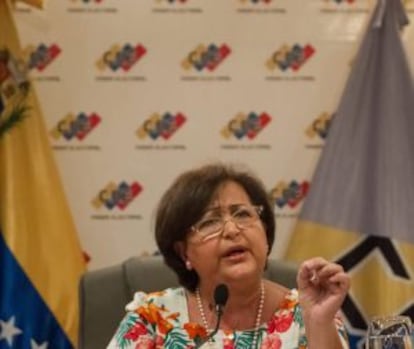Venezuela to hold parliamentary elections on December 6, say officials
President Maduro had been under increasing pressure from the opposition to set a date

Following weeks of pressure from the opposition, Venezuela announced on Monday that parliamentary elections will take place on December 6.
“Never – at no given moment – did this electoral body state that there was not going to be an election process this year,” said Tibisay Lucena, National Election Council (CNE) president, during a news conference with reporters.
Following the announcement, supporters of jailed opposition leader Leopoldo López, including his wife and father, asked him to end his nearly one-month-long hunger strike.
López, who has been charged with sedition and other crimes related to the violent February 2014 anti-government riots, went on a hunger strike to protest Maduro’s slow response to demands to set a date for parliamentary and regional races.
Recent polls show that the opposition may take control of the National Assembly for the first time
Recent polls show that the opposition may take control of the National Assembly, where Maduro and his allied parties have held on to power since the legislative body was reorganized into a unicameral chamber in 2000 under the late President Hugo Chávez.
Former Spanish Prime Minister Felipe González – who cut short a trip to Caracas earlier this month after he was stopped from seeing López – was one of many international figures who had publicly called on Maduro to guarantee that the elections would be held this year.
Dispelling rumors that the election would be cancelled, Lucena said that the CNE had been working hard to prepare for the vote by updating registration lists and creating new voting polls.
The CNE also had to prepare for the opposition’s primaries, which were held on May 17, and this Sunday’s primary for the ruling United Socialist Party of Venezuela (PSUV), she said.
One of the demands from the opposition is that international observers be allowed to monitor the elections. Both the European Union and Organization of American States (OAS) have expressed interest in sending delegations.
However, Lucena only mentioned that a group from the Union of South American Nations (Unasur), a body that Chávez helped create, would be invited to serve as an observer.
The elections are crucial for many Venezuelans, who are seeking a peaceful political transition while at the same time struggling with severe shortages of food and basic supplies, high inflation and a soaring crime problem.
The father and wife of opposition leader Leopoldo López have asked him to end his hunger strike
According to the latest poll taken by Hinterlaces, 76 percent of Venezuelans who are eligible to vote have said they will cast their ballots at the polls this year.
The official campaign will kick off on November 13, Lucena said, adding that the CNE does not work under pressure from anyone and criticizing the “attacks” made against the electoral body on social networking sites.
According to another pollster, Datanálisis, only six out of 10 Venezuelans trust the CNE.
After the date was announced, opposition lawmakers and candidates called on López to end his hunger strike, which has been joined by another 100 or so opposition officials. Others issuing the call included López’s father, the Catholic cardinal in Caracas and fellow opposition leader Henrique Capriles.
López’s wife, Lilian Tintori, said her husband can no longer walk.
Tu suscripción se está usando en otro dispositivo
¿Quieres añadir otro usuario a tu suscripción?
Si continúas leyendo en este dispositivo, no se podrá leer en el otro.
FlechaTu suscripción se está usando en otro dispositivo y solo puedes acceder a EL PAÍS desde un dispositivo a la vez.
Si quieres compartir tu cuenta, cambia tu suscripción a la modalidad Premium, así podrás añadir otro usuario. Cada uno accederá con su propia cuenta de email, lo que os permitirá personalizar vuestra experiencia en EL PAÍS.
¿Tienes una suscripción de empresa? Accede aquí para contratar más cuentas.
En el caso de no saber quién está usando tu cuenta, te recomendamos cambiar tu contraseña aquí.
Si decides continuar compartiendo tu cuenta, este mensaje se mostrará en tu dispositivo y en el de la otra persona que está usando tu cuenta de forma indefinida, afectando a tu experiencia de lectura. Puedes consultar aquí los términos y condiciones de la suscripción digital.








































